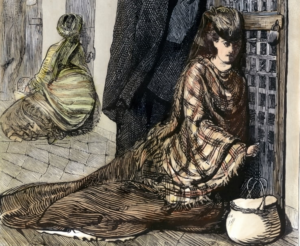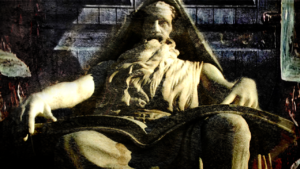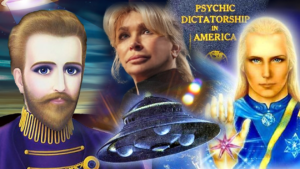Dodekatheon in Proclus’ order of causation part 2

Part Two, by Alexander Iulianus.
The Gods and Goddesses
The gods and goddesses described in the following sections have been listed by order of their causes. However, it must not be misunderstood as being an explicit hierarchy of rulership. The order is according to the order of their act’s fulfilment and not by their authority over one another.
Divine authority, or imperium, is first held wholly by Zeus. Zeus then distributes his imperium to Hera and Poseidon, so making Zeus, Poseidon, and Hera the effectual superiors to the rest of the Olympian gods and goddesses. From these three then the rest of the dodekatheon receive their imperium.
A final note is that this hierarchy is according to the Greek tradition. Both the Greek and Roman traditions had many religious developments over the long time they were observed, so in some cases there may be differences. Most notably is in how Mars held a far loftier and more Jovian role than Ares, not embodying the same chaotic character as his Greek counterpart.
Nonetheless, the following does cohere with the natures of these gods and Proclus’ causes prove their harmony. They have been labelled according to their nature.
Makers
Animators
Harmonizers
Watchers
1. Zeus, Poseidon, and Hades (makers) are traditionally a triad within Zeus, and so are all Zeus, though Hades is not included in the dodekatheon as he resides in the Underworld, not in Olympus. Zeus is the beginning as Zeus is the supreme; he is the king of the gods, he rules over them. Like a kingdom, all power held within the kingdom is by virtue of the king’s power being distributed from the crown to the kingdom’s many faculties. His throne is the power of Ouranos, Kronos, and himself combined.
2. Poseidon (maker) comes after Zeus as Poseidon, being the god of the seas and being granted lordship over the second of the three portions allotted to the brothers (the other two being the heavens to Zeus and the underworld to Hades), is the origin of life. Water in ancient times was associated with potential for life and to be the origin of beings.
3. Hera (animator) presides over the series of beings because it is through Hera, goddess of marriage and birth, that the series of beings are created as she is in union with Zeus (and by virtue of that, Poseidon too, a tradition we see promoted by Gemistos Pletho).
4. Hephaistos (maker) god of metalworking, volcanos, fire, sculpture, masonry, smithing, and so on, is life as the element of fire is associated with the spark of life in the ancient world and since he is the god of sculpture, metalworking, and so on, he is associated with giving shape and form to things. By classical elements too, life is a combination of air (Zeus), water (Poseidon), earth (Hera), and fire (Hephaistos). I forget who, maybe Plato? and likely others, said that life is a product of fire being imparted upon the mixture of water, earth, and air, furthering Hephaistos’ role in being the hyparxis of life, to which he gives form.
5. Demeter (animator) leads the series of lives as Demeter enables life to be self-generative. She is the goddess of the harvest, agriculture, fertility. She is also the goddess of divine or sacred order, and so the order of the living is made to participate in the order of divinity.
6. Apollo (harmonizer) god of the sun and sunlight, of knowledge, of music and the arts, of healing and protection from evil, is given intellect because it is through Apollo that life is made possible. Light as a necessity for life, without which the generative powers of Demeter would be null and the formative powers of Hephaistos baseless, and so Apollo causes soul with Demeter as soul combines the form (Hephaistos), the power to form (Apollo), and the serial generation of form (Demeter). All these form intellect as they are the spiritually intelligible.
7. Artemis (animator) is the series of intellects because she is the goddess of the Moon – a direct recipient of Apollo’s light (and the twin sister of Apollo). The Moon, being in the series of luminaries after the Sun (keeping in mind that Apollo is the god of ALL light, not just our specific Sun’s light), it is responsible for giving the cosmos the immediate presence of the intellects (the luminaries) even when the leader of intellect itself is not directly seen (as the Moon is a reflection of the Sun’s light even though the Sun can’t be seen). And so this ties into Artemis’ role in being the cause of paradigms as paradigms are the means by which the series of intellects present the leader of intellect (as light is a means of presenting the luminaries from which it comes).
8. Hermes (harmonizer) as the messenger god and psychopomp, is the leader of soul as he stands as mean between hypercosmos and cosmos. Like all the souls who take after him, he is both a participant in the divine world and the temporal world. He is the cause of paradigms with Artemis as he facilitates the passage of the paradigms produced by the intellects into the cosmos.
9. Aphrodite (harmonizer) goddess of love, beauty, and procreation, leads the series of souls as it is by her that the souls multiply. She is the goodness of the cosmic forms, imparting beauty and love to the world which drives souls to pursue their continual reproduction, and so in a sense she becomes the mother of temporal generation – in the Greek and Roman cult of Aphrodite, she was known as a mother goddess. She is married to Hephaistos, and so it can be said that she gives birth to the forms as they preside in the cosmos via her partnership with Hephaistos.
10. Athena (watcher) is the leader of body and the end of paradigms because she is the goddess of wisdom and battle. As feminine wisdom, she is the total wisdom of the world, and so she is body because the totality of body knows itself and acts in accord with itself by its own knowledge. She was birthed fully adult directly from the forehead of Zeus, symbolising that she is a whole product of the divine mind. She is a virgin and perpetually chaste, representing that in her is the end of generation (and hence why she is the last in the series of triadic generation). She is the goddess of battle, generals, and strategy because conflict is integral to the cosmos, but she is goddess of generalship and strategy to emphasise that she, by her wisdom, has overcome the “chaos” of conflict and has brought it into order. She was known as “Polias” and “Poliouchos” in her cult, both derived from ‘polis’ i.e. city/city-state, and so complementing her place as a goddess of strategy that has overcome the chaos of conflict within the cosmos, she is civilisation as the polis stands as a unit which overcame nature.
11. Ares (watcher) is god of war, brother of Athena. But especially within the Greek tradition, unlike his sister, he is the chaos of warfare and disorderly conflict. He is destructive, dangerous, savage, and rides his chariot with Phobos (fear), Deimos (terror), and Enyo (discord). This makes him the leader of bodies, as the cosmos without wisdom is destructive and dangerous, seemingly savage, and filled with fears, terrors, and discord. He is chaos in the sense that he represents the cosmos experienced by those without control. In myth, he was a lover of Aphrodite, presenting how even in the realm of bodies, though inferior in their good, we can still be led to commit adultery with it and betray our true form (as Hephaistos was the crafter of form, Aphrodite betrayed him in favour of Ares). Hephaistos captures them in the act and humiliates them after he was informed by Helios of Aphrodite’s infidelity, showing that the good reigns supreme and that adultery with the body leads to humiliation and defeat.
12. Finally, Hestia (watcher) goddess of the hearth, family, home, the state, and associated with the element of earth, is matter. Matter is necessarily presided over by a feminine principle as matter is the receptive and passive, awaiting another to impart upon it form to give it generation and form (just as the woman stands capable of the production of children and is the entirety of that process, but without the input of man she can produce nothing despite all her potentiality to do so). Homeric hymns to Hestia say that she has “one mind with Zeus the all-wise”, and in the second hymn to her it said that “without you mortals hold no banquet”.
She was the first of Kronos’ children, Kronos consuming her as he consumed all his children save Zeus. She was also the last to be “yielded up again” after Kronos was made to regurgitate his children by Zeus. This makes her the first and the last, the eldest and the youngest, encapsulating the nature of Matter being also the first – in the sense that matter was caused immediately by The One/Zeus (who gave cause to his siblings being regurgitated from Kronos), but is also the last in the order of beings. Matter is also the eldest as it has eternally existed alongside The One, but it is also the youngest as it is perpetually generative and youthful.
Read Part One
https://apotheism.com
@Apotheiite












1 thought on “Dodekatheon in Proclus’ order of causation part 2”